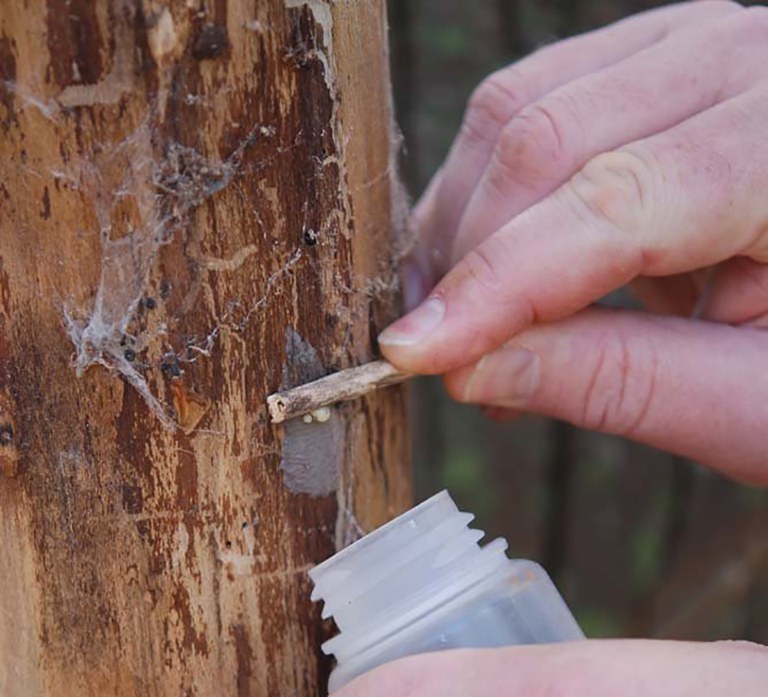Posted: January 11, 2019
We’ve now traded the growing season’s lively buzz for the still, quiet woods of winter, but even during this time of year, we can be proactive and vigilant in monitoring and managing forest health threats.

Once you’ve identified an egg mass, use a hard, flat edge to scrape the masses off of the surface and into a container filled with alcohol or hand sanitizer.(Photo by Pennsylvania Department of Agriculture.)
By now, you likely know about the spotted lanternfly (SLF), an invasive insect relatively new to Pennsylvania that feeds on the sap of over 70 different species and presents a significant threat to the state's agricultural industries. Thirteen southeastern Pennsylvania counties are currently under quarantine where this insect is found. SLF is an insect with one generation per year, meaning that any nymphs or adult insects you may have seen hopping or flying around in fall are now dead. However, eggs laid on stones, tree trunks, yard waste, and almost any other solid surface at the end of the SLF breeding season still present significant risk. Because the SLF egg mass is small, easily camouflaged (it can appear waxy or cracked and grey to brown, very much like mud splatter), and often laid in sheltered locations (like the undersides of picnic tables or hidden by flaking bark), it can be hard for people to spot. Unnoticed egg masses hitching a ride on vehicles, equipment, and other materials is one of the primary means of spread for this insect in our region. Therefore, it is important for you to locate and destroy egg masses where you live and inspect items you plan to move around the state.
Do:
- Check all surfaces of vehicles or items stored outdoors that may be moved from the property and destroy egg masses if you find them. The Pennsylvania Department of Agriculture's (PDA) "Checklist for Residents" can help. Search for egg masses on stationary objects too - those insects will hatch out on your property!
- Scrape egg masses using a hard, flat edge (e.g., a credit card, stick, or knife) into a receptacle containing alcohol (e.g., rubbing alcohol or hand sanitizer) before disposal.
- Inform friends and neighbors about the risk and what they can do to combat SLF's spread.
- Report sightings of SLF egg masses, if you find them outside of the quarantine, online (at the PDA website listed on page 2) or by calling 1-888-4BAD-FLY.
Don't:
- Transport any materials before a thorough check for egg masses.
- Destroy deadwood features in your woodlots solely out of concern for SLF egg masses they may harbor. Coarse woody debris in forests is a very important wildlife habitat feature.
- Consider egg mass scraping on your property to be futile. Each egg mass contains 30-50 SLF individuals waiting to hatch out this spring. Even one hour of effort to reduce their numbers can have notable impact.
These precautions are imperative if you live within the quarantine area or know that SLF is in your neighborhood, but these steps are a good idea even if you live outside the quarantine. Remember that once you inspect a vehicle you plan to move this winter or spring, no new egg masses will be laid until next summer/fall; your once-yearly due diligence is complete.
If you operate a business - any business, not just one involving agricultural products - that regularly moves vehicles or materials within or across SLF quarantine boundaries, now is also a great time to set aside 1-2 hours to complete the free SLF permit training. The required permit, issued by the PA Department of Agriculture, indicates that you and your employees are aware of how SLF behaves, the risk it presents, and best practices you can employ to prevent the spread of this insect.
For more on SLF, visit these websites:
Penn State Extension's Spotted Lanternfly Website
Pennsylvania Department of Agriculture's Spotted Lanternfly Website
James C. Finley Center for Private Forests
Address
416 Forest Resources BuildingUniversity Park, PA 16802
- Email PrivateForests@psu.edu
- Office 814-863-0401
- Fax 814-865-6275
James C. Finley Center for Private Forests
Address
416 Forest Resources BuildingUniversity Park, PA 16802
- Email PrivateForests@psu.edu
- Office 814-863-0401
- Fax 814-865-6275

